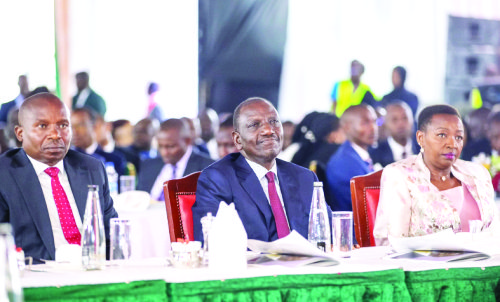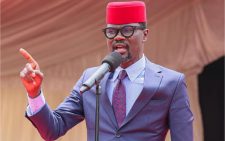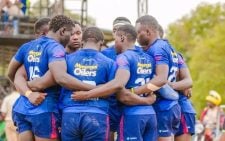Prayers in palaces, pain in the streets

Long before colonial borders and modern political systems, African communities practised communal prayers that were deeply rooted in their daily lives.
After a bountiful harvest, during times of drought, or when hunger threatened, elders and community members would gather to offer prayers—not as a mere ritual, but as a sincere plea to the divine for rain, protection, and the well-being of the people.
These prayers were moments of reflection, unity, and honest acknowledgement of shared challenges.
Prayer was not an empty tradition; it was a vital, living connection between the people and their spiritual world.
Today, Kenya’s political class annually gathers in luxurious hotel ballrooms for the National Prayer Breakfast.
On the surface, this event mirrors those communal prayers of old—a gathering meant for national repentance, reflection, and seeking divine guidance.
The president, deputy president, members of parliament, clergy, diplomats, and business elites bow their heads together, ostensibly to pray for the nation.
Moral failings
Yet, for many ordinary Kenyans watching from afar, this has become a hollow tradition—an annual spectacle of political theatre and spiritual hypocrisy.
To see the seriousness of this disconnect, consider this: while the political elite dine on lavish buffet breakfasts in comfort, a grandmother in Homa Bay County recently struggled to pay her grandchildren’s school fees.
In desperation, she took two live chickens to the school, hoping they would be accepted as payment.
What kind of prayer can connect with a nation when the powerful feast comfortably, while common men (wananchi) sacrifice the little they have to keep their children in school?
The very individuals who kneel before the nation in prayer are often the same ones implicated in corruption scandals, abuse of office, or ethnic incitement.
From embezzled COVID-19 funds to billions missing from infrastructure projects, these scandals remain unresolved.
The same voices that preach righteousness in prayer often spew divisive rhetoric at rallies. When prayer meetings become platforms to whitewash moral failings rather than confront and correct them, do they not lose their sacredness? Are they not merely performances?
The National Annual Prayer Breakfast is a non-partisan event meant to be a moment of repentance and reconciliation, yet rarely do the prayers extend to justice or accountability.
During these events, there are no public acknowledgements of wrongdoing, no commitments to return stolen funds and no restitution.
Instead, vague calls for “unity” and “forgiveness” dominate—treating accountability as an inconvenient barrier to spiritual devotion.
How can a nation truly heal when its leaders cloak their sins in pious language and evade responsibility?
Speeches given at the event often feel rehearsed and insincere. For example, speakers make statements: “I may have fallen short… I ask for forgiveness… I forgive those who have hurt me.”
Beautiful words, yet vague and without follow-up action, they ring hollow.
Plight of cancer patients
While the political elite feast and pray in comfort, millions of Kenyans endure hunger, unemployment, poor healthcare, and insecurity.
Cancer patients, for instance, recently faced a dire situation at Kenyatta National Hospital.
The hospital’s only functional Linear Accelerator machine—a critical tool for radiotherapy treatment—broke down, leaving patients stranded. One patient suffering from stage four cervical cancer was told to return in several days due to the equipment failure.
Such incidents highlight the stark contrast between the elite’s comfort and the struggles of ordinary citizens.
When the elite dine lavishly while the sick are turned away, what does this say about the sincerity of their prayers?
If we look to the example of Jesus Christ, whom many of these prayer breakfasts claim to honour, we find a starkly different approach to leadership and spirituality.
Jesus did not seek the comfort of palatial halls or the company of elites. Instead, He identified deeply with the suffering of the marginalised and oppressed.
Jesus healed the sick, fed the hungry, and spent time with tax collectors, prostitutes, and the poor—those rejected by society.
He did not retreat to privileged spaces but entered the homes and lives of the needy. In a radical act of humility, Jesus washed the feet of His disciples, a task usually reserved for servants.
This demonstrated servant leadership—a sharp contrast to leaders who expect to be served and honoured.
Ultimately, Jesus embraced the cross—a symbol of suffering and injustice—to redeem humanity. His path was not one of privilege but of sacrifice.
Moral transformation
In Matthew 20:28, Jesus said, “The Son of Man did not come to be served, but to serve, and to give his life as a ransom for many.”
In light of this, how can political leaders justify lavish prayer breakfasts while millions around them suffer? Does true faith not call for solidarity with the broken rather than comfort in elite circles?
Religious leaders at the event often offer blessings without challenging corruption or demanding justice.
When clergy become endorsers rather than prophets speaking truth to power, does faith not lose its power to demand reform?
Kenya has held National Prayer Breakfasts for over two decades, yet corruption, inequality, ethnic violence, and failing public systems persist.
If these prayers were sincere and effective, wouldn’t we witness a moral transformation among the political elite?
Instead, the event has become a ritual devoid of spiritual consequence or national transformation. A country that prays without reform is merely performing religion—speaking to God while ignoring the cries of the people.
Kenya needs prayer—not the kind that masks wrongdoing, ignores justice and recycles piety without repentance.
The true national prayer must begin with honesty, lead to humility, and culminate in action. How long will we allow prayer to be a cloak for failed leadership?
Until the National Prayer Breakfast becomes a genuine moment of national soul-searching and accountability, will it ever be more than a hollow ritual, far removed from the sincere communal prayers of our ancestors?
As Kenya approaches its 62nd Madaraka Day, it’s imperative to reflect on the nation’s journey. This day should not be an occasion for political elites to showcase opulence but a moment for collective introspection.
Let it be a day where leaders commit to transformative action, ensuring that prayers are matched with deeds.
Happy 62nd Madaraka Day Celebration!
The writer is a History Lecturer & UASU Chapter Trustee, Alupe University-Kenya.














